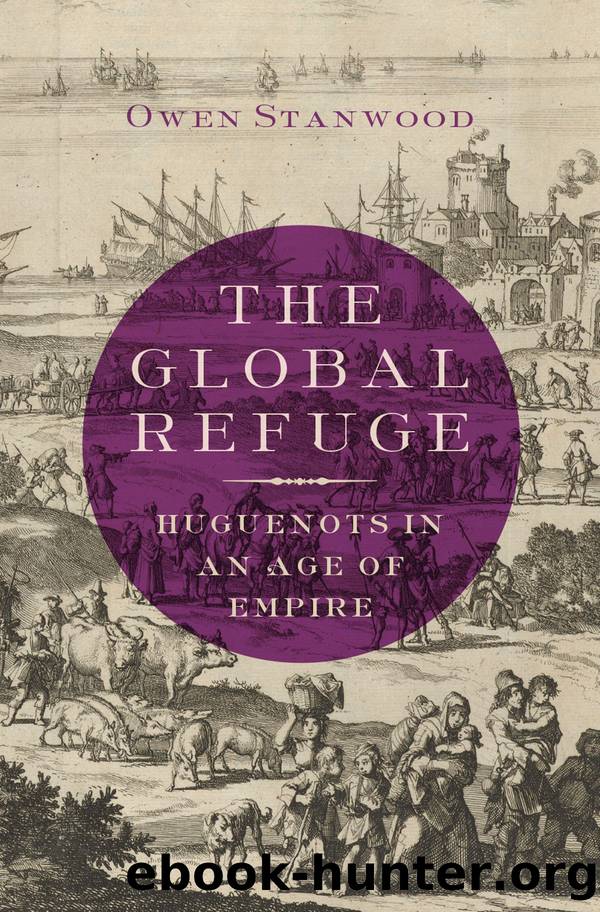The Global Refuge by Stanwood Owen;

Author:Stanwood, Owen; [Stanwood, Owen;]
Language: eng
Format: epub
ISBN: 9780190264741
Publisher: OxfordUP
Published: 2019-09-15T00:00:00+00:00
In 1713 the War of the Spanish Succession ended and peace returned to Europe and its colonies. Few were more jubilant than the Huguenot refugees, who had suffered so much during the previous decades of conflict. Only two years after the end of hostilities another signal event occurred, as the old persecutor Louis XIV met his demise. His great-grandson Louis XV, a boy of five, took the throne, leading to a period of uncertainty as regents assumed control of the kingdom. Writing to his brother in Normandy, New York merchant Thomas Bayeux reflected on these changes. He hoped that the Sun Kingâs death would lead to a relaxation of laws against Protestantism, and he âprayed to Godâ that he would forgive and bless the nouveaux convertis, the poor Protestants who had become Catholic to stay in France. While he hoped for improvement, he did not believe that he himself would ever return to his homeland. He earnestly desired to âhave occasion to see you again and embrace you and your dear family,â but he and his family were âso well established and so attached here,â and the voyage home was too long. Indeed, his descriptions of his life made Bayeux somewhat resemble John Laurens, another merchant he may have known personally. In other letters to his mother he made clear that he was raising his children to be good English subjects. They did study in a local French school, but he also made sure they learned the empireâs dominant language, and he intended to send his children to England for schooling when they reached the proper age. Bayeux retained family and business ties to Europe and France, but he plainly declared where his own allegiances lay. He was a New Yorker and more importantly, a subject of King George I.87
Bayeuxâs letters suggests a kind of end to the history of the Huguenot refuge. The diaspora formed in order to preserve the French Protestant churches in exile. Ministers like Pierre Simond or even Claude Philippe de Richebourg, as they cozied up to their Dutch and British patrons, tried to preserve some level of autonomy in their communities. For Bayeux and others, though, the rewards of blending in were just too great. For their children, often raised in a bilingual environment with no memories of the homeland, the process was even more rapid. In the second generation, as numerous historians have attested, levels of outmarriage were quite high among the Huguenots, and by mid-century many of the French Protestant churches were gone, as they had few people left in the pews. With a return to France now out of the question, Huguenots had no reason to remain French any longer. They became British, or Dutch, or German, and gradually their ancestry became a point of pride but little more than that.88 This was undoubtedly the case for some refugees. But it was not the universal experience, and indeed, in some isolated cases refugees did manage to go home again, even as they
Download
This site does not store any files on its server. We only index and link to content provided by other sites. Please contact the content providers to delete copyright contents if any and email us, we'll remove relevant links or contents immediately.
Machine Learning at Scale with H2O by Gregory Keys | David Whiting(3618)
Never by Ken Follett(3523)
Fairy Tale by Stephen King(2945)
The Man Who Died Twice by Richard Osman(2807)
Reminders of Him: A Novel by Colleen Hoover(2753)
Will by Will Smith(2577)
Rationality by Steven Pinker(2148)
It Starts With Us (It Ends with Us #2) by Colleen Hoover(2031)
Can't Hurt Me: Master Your Mind and Defy the Odds - Clean Edition by David Goggins(2003)
Friends, Lovers, and the Big Terrible Thing by Matthew Perry(1992)
The Stranger in the Lifeboat by Mitch Albom(1935)
The Becoming by Nora Roberts(1914)
New Morning Mercies: A Daily Gospel Devotional by Paul David Tripp(1812)
Love on the Brain by Ali Hazelwood(1810)
HBR's 10 Must Reads 2022 by Harvard Business Review(1696)
The Strength In Our Scars by Bianca Sparacino(1693)
A Short History of War by Jeremy Black(1668)
Never Finished: Unshackle Your Mind and Win the War Within by David Goggins(1547)
515945210 by Unknown(1519)
